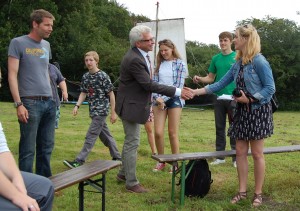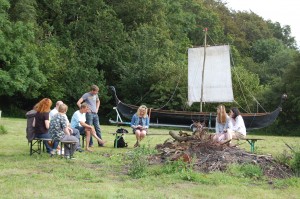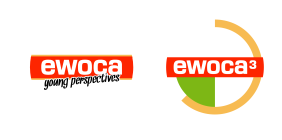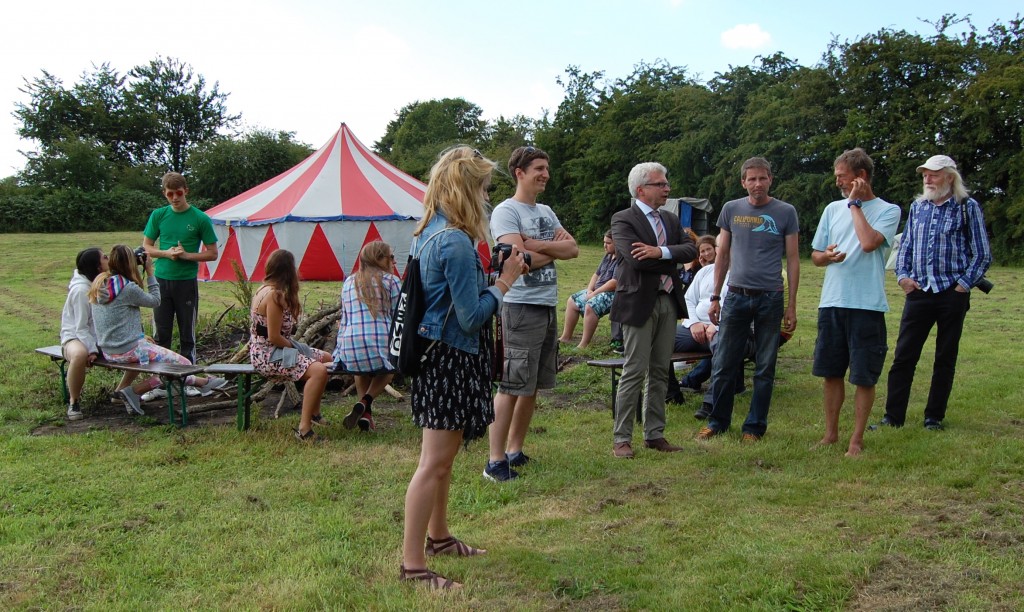Not just lazing around during the summer break, but realising sustainable projects with others – this is the motto of about 300 youths from 17 European countries at the moment. They take part in the international workcamps of the ewoca³ and ewoca³(+) support programmes. One example is Knivsberg in Denmark: There, youths from Germany, Ukraine and Denmark began building a seaworthy reconstruction of a real Viking boat.
The project of the association “Alte Schule e.V.” from Buchholz in Schleswig-Holstein, in collaboration with its two partner organisations from Denmark and Ukraine, will take a total of three years. During the summer breaks of 2016 and 2017, the youths will continue to work on the boat, during workcamps in the two other participating countries. And finally, in the summer of 2017, a big sailing trip is planned – in Ukraine, where the boat will remain and continue to be used for international youth work.
 So much voluntary work during the summer break seems to be contagious. On Wednesday, the 5th of August, Albert Klein-Reinhardt visited the workcamp at Knivsberg. He is Officer for European and International Youth Work at the Federal Ministry for Family Affairs, Senior Citizens, Women and Youth. “I am currently on my vacation in Denmark, so clearly I will come over and take a look at the ewoca project close by. It is a very valuable project”, Klein-Reinhardt explains his personal voluntary work. From hundreds of projects, the ewoca³(+) programme was chosen as especially innovative, and therefore funded by the Ministry’s Innovation Fund. “This is not just about the ship, but we are rewarding new ways to connect the regional and the international. As history and current affairs also play a big role, this ewoca project can be classified as innovative”, said Klein-Reinhardt. The Federal Ministry enables a total of three such three-year ewoca³(+) partnerships, in each of which a German youth work organisation collaborates with two European partners.
So much voluntary work during the summer break seems to be contagious. On Wednesday, the 5th of August, Albert Klein-Reinhardt visited the workcamp at Knivsberg. He is Officer for European and International Youth Work at the Federal Ministry for Family Affairs, Senior Citizens, Women and Youth. “I am currently on my vacation in Denmark, so clearly I will come over and take a look at the ewoca project close by. It is a very valuable project”, Klein-Reinhardt explains his personal voluntary work. From hundreds of projects, the ewoca³(+) programme was chosen as especially innovative, and therefore funded by the Ministry’s Innovation Fund. “This is not just about the ship, but we are rewarding new ways to connect the regional and the international. As history and current affairs also play a big role, this ewoca project can be classified as innovative”, said Klein-Reinhardt. The Federal Ministry enables a total of three such three-year ewoca³(+) partnerships, in each of which a German youth work organisation collaborates with two European partners.
 Besides the practical work on the Viking boat, the youths take part in workshops dealing with the situation of minorities. “Were the Vikings a European minority?” Using this question, which only at first seems strange, the participants build a bridge from their historical work to topics currently discussed in Europe. But the workcamp itself is also a practical contribution to European understanding. Working on the boat, living together in the camp, the nights at the camp fire, playing together – this creates strong bonds. “You cannot feel distance any more. Nationalities have vanished, you are primarily human. It should be like this all the time”, camp participant Louis Bartel (22) from Ratzeburg in Schleswig-Holstein said.
Besides the practical work on the Viking boat, the youths take part in workshops dealing with the situation of minorities. “Were the Vikings a European minority?” Using this question, which only at first seems strange, the participants build a bridge from their historical work to topics currently discussed in Europe. But the workcamp itself is also a practical contribution to European understanding. Working on the boat, living together in the camp, the nights at the camp fire, playing together – this creates strong bonds. “You cannot feel distance any more. Nationalities have vanished, you are primarily human. It should be like this all the time”, camp participant Louis Bartel (22) from Ratzeburg in Schleswig-Holstein said.

